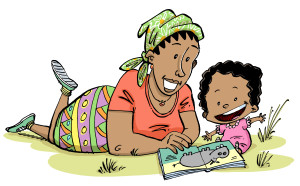 Helping young children to develop the ability to read and write is a serious business because being literate is extremely important in our daily lives. But we also need to remember that we don’t have to actively teach or tell children aboutbooks and reading. Instead, we need to allow our children to learn about books by exploring them. One of the ways we can do this is by giving them opportunities to play with books. Being allowed to be playful with books helps children to become literate.
Helping young children to develop the ability to read and write is a serious business because being literate is extremely important in our daily lives. But we also need to remember that we don’t have to actively teach or tell children aboutbooks and reading. Instead, we need to allow our children to learn about books by exploring them. One of the ways we can do this is by giving them opportunities to play with books. Being allowed to be playful with books helps children to become literate.
Here are some the ways that children at different stages of development might “play” with books.
* Babies like to try out books by touching, patting, shaking and even chewing them! They are also great listeners and imitators. Often they make sounds and clap their hands to show how much they are enjoying us reading to them. Try giving babies board and cloth books when you want to allow them to handle books on their own, like during nappy changes. These kinds of books are tough and don’t break easily.
* Older babies enjoy books with flaps, pop-ups and buttons that they can press to make sounds. They also like to point to things on the page or to try turning the page.
* Many toddlers like to pretend to read aloud and older children often like to pretend to be “the teacher” and read to the class. They can be found turning the pages of a storybook telling their own story as they go, or retelling a story they have heard often – sometimes even with the book upside down! They’re practicing reading and showing you that they understand what books are about. Encourage them by making sure that there are always some books around for them to pick up and “read” when they want to.
* Young children often act out stories they know, or create their own, using familiar story characters. In these imaginary play times, children learn about symbols – when they use a stick as a fairy’s magic wand or a box as a car, it means that they understand how one thing can “stand for” another. This is important for literacy learning. Encourage your children’s imaginary play by reading lots of different kinds of stories to them.
Playing with books offers children opportunities to learn important literacy lessons and – best of all – it’s what children do naturally when we read to them and have books to choose from in their environment.

